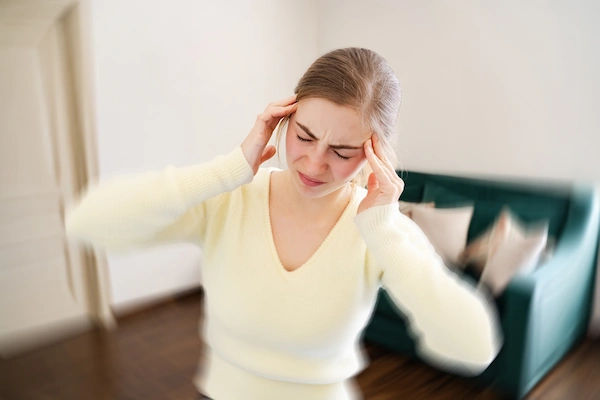Guide to Fainting Can Be Linked Your Heart Not Brain
Discover how fainting can be connected to heart issues rather than the brain, with insights into causes, risks, and when to seek medical help.

Written by Dr. Dhankecha Mayank Dineshbhai
Reviewed by Dr. Vasanthasree Nair MBBS
Last updated on 13th Jan, 2026

Introduction
We’ve all seen it in movies: a character gets shocking news and dramatically collapses into a faint. In reality, fainting, medically known as syncope, is a common experience affecting about one in three people at some point. While it's often brushed off as a simple case of standing up too fast or being overly stressed, it can sometimes be a critical warning sign of an underlying heart condition. This guide will demystify fainting, exploring the crucial link between your heart and your brain during an episode. We'll move beyond the common misconceptions to help you understand when a faint is a benign event and when it warrants immediate medical attention, empowering you to take the right steps for your health.
What Exactly Happens When You Faint?
At its core, fainting is a temporary loss of consciousness caused by a brief reduction in blood flow to the brain. Think of your brain as the command center that requires a constant, rich supply of oxygenated blood to function. Your heart is the powerful pump responsible for delivering that blood. A faint occurs when this delicate delivery system is disrupted.
The Brain's Oxygen Shortfall
When something interferes with blood flow, whether it's a sudden drop in blood pressure, a malfunctioning heart rhythm, or a neural miscommunication, the brain is the first to feel the effects. To protect its most vital structures, it essentially "shuts down" non-essential functions, leading to a loss of consciousness. Falling to the ground is actually a protective mechanism; by becoming horizontal, it becomes easier for the heart to pump blood back to the brain, which usually leads to a quick recovery. Understanding this heart-brain connection is the first step in decoding the true cause of a fainting spell.
Consult a Cardiologist for the best advice
Not All Fainting is Created Equal: Common vs. Cardiac Causes
Fainting episodes are broadly categorised based on their origin. The majority are not directly life-threatening, but distinguishing between them is vital.
Vasovagal Syncope: The Most Common Culprit
This is the classic fainting episode often triggered by a stimulus that overwhelms the nervous system. Common triggers include the sight of blood, intense emotional distress, severe pain, or even standing for long periods in a hot room. In vasovagal syncope, the body experiences a miscommunication between the brain and the heart. The nervous system overreacts, causing a sudden drop in heart rate and blood pressure. This reduces blood flow to the brain, leading to fainting. The key feature here is that the heart itself is usually healthy; the problem lies with the neural wiring.
Situational Syncope: Triggered by Specific Actions
This is a subtype of reflex syncope that occurs during or immediately after a specific action. Examples include fainting during coughing, swallowing, laughing, or even while urinating. Like vasovagal syncope, these actions trigger a reflex that leads to a drop in blood pressure and heart rate.
When Fainting Points Directly to a Heart Problem
This is the most critical category to understand. Cardiac syncope occurs when an underlying heart condition directly causes the loss of consciousness. It accounts for about 10-15% of fainting cases in emergency rooms and is considered more serious because it can be a warning sign of sudden cardiac arrest.
Cardiac Syncope: A Dangerous Warning Sign
Unlike reflex faints, cardiac syncope often occurs with little to no warning. It can happen when you are lying down or during physical exertion, which is a major red flag. The underlying issue is that the heart is unable to pump enough blood to meet the body's demands, directly impacting the brain.
Arrhythmias: When the Heart's Rhythm Goes Awry
An arrhythmia is an abnormal heart rhythm. It can cause the heart to beat too fast (tachycardia), too slow (bradycardia), or irregularly. When the rhythm is disrupted, the heart’s pumping efficiency plummets. A common cause is a condition called Sick Sinus Syndrome or atrial fibrillation, which can lead to pauses in the heartbeat long enough to cause a drop in blood flow to the brain and result in a fainting spell.
Structural Heart Problems: A Physical Blockage
Sometimes, the problem is a physical obstruction that prevents blood from leaving the heart. Conditions like aortic stenosis (a narrowing of the heart's aortic valve), hypertrophic cardiomyopathy (a thickened heart muscle), or even a heart attack can physically block or severely reduce blood flow. During exertion, when the body needs more blood, the heart can't keep up, leading to fainting. This is a medical emergency.
Key Differences: How to Tell Common Fainting from a Heart-Related Episode
While only a doctor can provide a definitive diagnosis, there are clues that can help differentiate a benign faint from a more serious one.
If you experience fainting with no warning, especially during exercise, or have a family history of heart conditions, it is crucial to consult a doctor.
What to Do If You Faint: Immediate Steps and Medical Evaluation
If you feel faint: Lie down immediately and elevate your legs. This uses gravity to help blood flow back to your heart and brain. If you can't lie down, sit down and put your head between your knees.
After a fainting episode, even if it seems minor, you should see a doctor. Be prepared to describe the event in detail: what you were doing, how you felt before and after, and any relevant medical history.
Diagnostic Tests Your Doctor Might Recommend
To determine the cause, your doctor may recommend tests such as:
- Electrocardiogram (ECG/EKG): A simple, painless test that records your heart’s electrical activity to check for arrhythmias.
- Echocardiogram: An ultrasound of your heart to look for structural problems.
- Holter Monitor or Event Monitor: A portable ECG you wear for days or weeks to catch intermittent rhythm issues.
- Tilt-Table Test: Specifically used to diagnose vasovagal syncope by simulating the changes in position that trigger a faint.
Apollo24|7 offers convenient home collection for tests like ECG and blood work, making initial diagnostics easier.
Prevention Strategies: Managing Your Risk Based on the Cause
Prevention depends entirely on the cause.
- For vasovagal syncope: Stay hydrated, avoid triggers, and learn to recognise warning signs so you can sit or lie down quickly. For some, compression stockings can help.
- For cardiac syncope: Treatment is directed at the underlying condition. This may include medications, a pacemaker to correct a slow heartbeat, an implantable cardioverter-defibrillator (ICD) to stop dangerous fast rhythms, or even surgery to correct a structural issue.
Conclusion: Listen to Your Body's Signal
Fainting is your body's dramatic way of signaling that the essential partnership between your heart and brain has been momentarily disrupted. While often harmless, it is a symptom that should never be ignored. By understanding the critical difference between a common reflex faint and a potentially life-threatening cardiac event, you empower yourself to seek the right care. If you or a loved one experiences a fainting episode, especially with any red flags, view it as an important message from your body. Taking it seriously and getting a proper evaluation is the best way to ensure your long-term health and peace of mind. If symptoms persist or you have concerns about your heart health, consult a doctor online with Apollo24|7 for further evaluation.
Consult a Cardiologist for the best advice
Consult a Cardiologist for the best advice

Dr. Rajeev Garg
Cardiologist
30 Years • MD (MEDICINE); DIP. CARD ( NIMS ) DNB (CARDIOLOGY) MNAMS, FACC, FESC, FSCAI.
Hyderguda
Apollo Hospitals Hyderguda, Hyderguda

Dr. Pathuri Avinash
Cardiologist
6 Years • "DM- CARDIOLOGY IPGMER & SSKM, KOLKATA September 2017- September 2020 MD- INTERNAL MEDICINE MANIPAL ACADEMY OF HIGHER EDUCATION KASTURBA MEDICAL COLLEGE, MANIPAL May 2013 - May 2016 MBBS RANGARAYA MEDICAL COLLEGE,KAKINADA March 2006- March 2011"
Hyderabad
Apollo Hospitals Financial District, Hyderabad
Dr. Praveen Jaiswal
Cardiologist
17 Years • MD(Medicine), DM(Cardiology)
Indore
Apollo Hospitals Vijay Nagar, Indore

Dr Ravi Kanth T
Cardiologist
7 Years • MD, DM, PDF
Visakhapatnam
Apollo Hospitals Ramnagar Vizag, Visakhapatnam

Dr. Poorna Pushkala Natarajan
Cardiologist
5 Years • MBBS, AB (INT MED), AB (CARDIOLOGY), AB (HEART FAILURE/TRANSPLANT CARDIOLOGY)
Chennai
Apollo Hospitals Greams Road, Chennai
(50+ Patients)
Consult a Cardiologist for the best advice

Dr. Rajeev Garg
Cardiologist
30 Years • MD (MEDICINE); DIP. CARD ( NIMS ) DNB (CARDIOLOGY) MNAMS, FACC, FESC, FSCAI.
Hyderguda
Apollo Hospitals Hyderguda, Hyderguda

Dr. Pathuri Avinash
Cardiologist
6 Years • "DM- CARDIOLOGY IPGMER & SSKM, KOLKATA September 2017- September 2020 MD- INTERNAL MEDICINE MANIPAL ACADEMY OF HIGHER EDUCATION KASTURBA MEDICAL COLLEGE, MANIPAL May 2013 - May 2016 MBBS RANGARAYA MEDICAL COLLEGE,KAKINADA March 2006- March 2011"
Hyderabad
Apollo Hospitals Financial District, Hyderabad
Dr. Praveen Jaiswal
Cardiologist
17 Years • MD(Medicine), DM(Cardiology)
Indore
Apollo Hospitals Vijay Nagar, Indore

Dr Ravi Kanth T
Cardiologist
7 Years • MD, DM, PDF
Visakhapatnam
Apollo Hospitals Ramnagar Vizag, Visakhapatnam

Dr. Poorna Pushkala Natarajan
Cardiologist
5 Years • MBBS, AB (INT MED), AB (CARDIOLOGY), AB (HEART FAILURE/TRANSPLANT CARDIOLOGY)
Chennai
Apollo Hospitals Greams Road, Chennai
(50+ Patients)
More articles from Fainting
Frequently Asked Questions
1. Is fainting the same as having a seizure?
Not usually. While both involve a loss of consciousness, seizures are caused by abnormal electrical activity in the brain and often involve jerking movements, biting the tongue, and a longer recovery period (post-ictal state). Fainting is due to reduced blood flow, and recovery is typically quick.
2. I sometimes feel lightheaded when I stand up. Is that fainting?
This is called orthostatic hypotension, a common cause of feeling dizzy and faint when standing up. It's a mild form of pre-syncope (almost fainting). If you actually lose consciousness, it's classified as syncope and should be evaluated.
3. Can dehydration cause fainting?
Absolutely. Dehydration reduces your blood volume, which makes it harder for your heart to maintain adequate blood pressure, especially when you stand up. This can easily lead to a drop in blood flow to the brain.
4. What are the warning signs of a heart-related fainting spell?
Key signs of cardiac syncope include fainting with no warning, fainting during exercise or while lying down, accompanying chest pain or palpitations, and a family history of sudden cardiac death.
5. Should I go to the ER every time I faint?
If it's your first time, you faint with exertion, experience chest pain or shortness of breath, or have a known heart condition, you should go to the ER. For a recurrent, typical vasovagal faint with a clear trigger, scheduling a prompt doctor's appointment is appropriate.

.webp)
.webp)